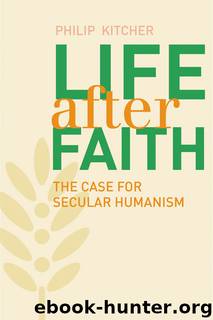Life after Faith by Philip Kitcher

Author:Philip Kitcher
Language: eng
Format: epub
ISBN: 9780300210347
Publisher: Yale University Press
FOUR
MORTALITY AND MEANING
I
In 1868, two years after he had finished the six movements originally planned for his German Requiem, Brahms inserted a seventh, a soprano solo punctuated by muted interjections from the chorus. The text he chose promises consolation: those who now grieve will be comforted, the bereaved will again see those they have lost. Brahms's setting acknowledges the depths of their sorrow, and responds with gestures of exquisite tenderness. Music-loving secularists, however resolute in their nonbelief, should concede its emotional power.
Culturally successful religions are often credited with enabling their followers to understand and to accept the major transitions in human life. They have, after all, had plenty of practice—typically centuries or millennia in which they have worked at shaping their rites. Those, like Christianity and Islam, that promise an eternal continuation to which mundane human life is a prelude, seem especially adept at coping with the last transition: death is supposedly easier for the devout to bear. Part of the relief comes from prospects of personal continuation and hopes for reunion with others who have been loved and lost. Consoling too is the faith that each finite human existence connects to something transcendent, and thereby gains an eternal significance. For the non-believer, however, there is no hope of future survival or of reclaiming the dead. Individual human lives are thoroughly finite, their effects evanescent. All human life will eventually cease. Our finitude leaves nothing to celebrate in the wake of a life. What use is Darwin at a funeral?
Mortality and meaning raise connected challenges for secular humanism. On matters of life and death, however, religion offers less, and secularism provides more, than is usually assumed.
II
How should a secular humanist think about the prospect of his own death? A classic recommendation sees fear as inappropriate: with death comes the end of pain, of suffering, of frustrated striving. Hamlet, meditating suicide, calls death “a consummation devoutly to be wished,” until, turning suddenly devout, he imagines an afterlife in which the torments of mundane existence continue. Secularists who dismiss that possibility can return to Hamlet's original stance: being dead is nothing to be frightened of.
There is, however, the getting there. Fear can be directed not toward the state itself, but at the process of dying. People are often afraid not only of the pains that come at the end, but also of the unraveling of body and mind, the losses of capacities relied on in their active days. So they are terrified at the thought of what they are likely to become, foreseeing the surviving being as a grotesque parody of themselves. Concerns of this sort are serious, deserving confrontation by the person who contemplates her own life's ending and support from those who might help her avoid, or at least mitigate, the conditions she fears. Support need not—probably should not—come from religion but from humane deployment of medical resources. Careful thoughts about the end should be fostered, expressed, developed in exchanges with those who know about the options, in “end of
Download
This site does not store any files on its server. We only index and link to content provided by other sites. Please contact the content providers to delete copyright contents if any and email us, we'll remove relevant links or contents immediately.
| Deconstruction | Existentialism |
| Humanism | Phenomenology |
| Pragmatism | Rationalism |
| Structuralism | Transcendentalism |
| Utilitarianism |
The remains of the day by Kazuo Ishiguro(7612)
Tools of Titans by Timothy Ferriss(7011)
The Black Swan by Nassim Nicholas Taleb(6248)
Giovanni's Room by James Baldwin(5950)
Inner Engineering: A Yogi's Guide to Joy by Sadhguru(5937)
The Way of Zen by Alan W. Watts(5839)
The Six Wives Of Henry VIII (WOMEN IN HISTORY) by Fraser Antonia(4822)
The Power of Now: A Guide to Spiritual Enlightenment by Eckhart Tolle(4802)
Astrophysics for People in a Hurry by Neil DeGrasse Tyson(4646)
Asking the Right Questions: A Guide to Critical Thinking by M. Neil Browne & Stuart M. Keeley(4634)
12 Rules for Life by Jordan B. Peterson(3790)
The Ethical Slut by Janet W. Hardy(3542)
Skin in the Game by Nassim Nicholas Taleb(3510)
Housekeeping by Marilynne Robinson(3450)
The Art of Happiness by The Dalai Lama(3416)
Double Down (Diary of a Wimpy Kid Book 11) by Jeff Kinney(3311)
Skin in the Game: Hidden Asymmetries in Daily Life by Nassim Nicholas Taleb(3296)
Walking by Henry David Thoreau(3257)
12 Rules for Life: An Antidote to Chaos by Jordan B. Peterson(3221)
